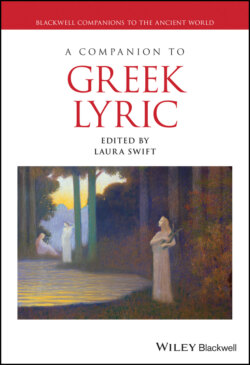Читать книгу A Companion to Greek Lyric - Группа авторов - Страница 72
Printed Editions and Corpora
ОглавлениеThe most common form of abbreviation in the papyrological world (and the one employed by this chapter) refers to a text’s principal publication, frequently within a larger series. P.Oxy. 32.2624, for example, refers to the 2624th papyrus in the Oxyrhynchus Papyri series, published in the thirty-second volume (N.B.: volume numbers can be indicated by Roman numerals). The Oxyrhynchus Papyri enumerates its papyri consecutively, in their order of publication, but some series reset the counter with each new volume.
Each series or individual volume of texts has its own designated abbreviation, which typically refers to an ancient site (e.g., P.Oxy. = Oxyrhynchus), a modern institution or collection (e.g., P.Ryl. = John Rylands Library, Manchester), an individual or archive either ancient or modern (e.g., P.Dryton, P.Turner), or some other unique identifier (e.g., P.Nekr.). A checklist of documentary editions with robust bibliographical information is now maintained online (http://papyri.info/docs/checklist), though exclusively literary editions are not included. Like the journal abbreviations that have been standardized by l’Année philologique, checklist abbreviations vastly simplify the process of citation and are therefore ubiquitous in papyrological scholarship.
But there are other ways of identifying a text, too. For one thing, every papyrus has a collection-specific inventory number under which it has been archived: when one is published outside of a series, therefore, it will continue to be identified by its inventory number (i.e., P.Fouad inv. 239, Figure 7.1) instead of a number assigned by the series. In some cases, a text published in this way can nonetheless be republished within a series (i.e., P.Köln inv. 21351 + 21376 = P.Köln 11.429). Additionally, when the works of a particular poet are collected in a standard edition, they are renumbered by their editor (the same is true when groups of poets are edited together). Not only can such systems of numeration be complicated by the addition, over time, of new discoveries to the corpus, but competing volumes or editions may assign different numbers to the same fragment! This companion has elected to use the enumeration of Campbell’s Loeb editions, but much has changed since they were first published: for Sappho and Alcaeus, scholars frequently cite the editions of either Lobel-Page (= LP) or Voigt (= V.); for elegy, the editions of West or Gentili-Prato compete. Sometimes it is not the editor but the title of an edition which provides an identifying acronym, e.g., Page’s Poetae Melici Graeci (= PMG) or Supplementum Lyricis Graecis (= SLG), Davies’ Poetarum Melicorum Graecorum Fragmenta (= PMGF), and Lloyd-Jones’ Supplementum Hellenisticum (= SH). For these, and other common abbreviations, see the Abbreviations and Standard Editions in this Companion.
